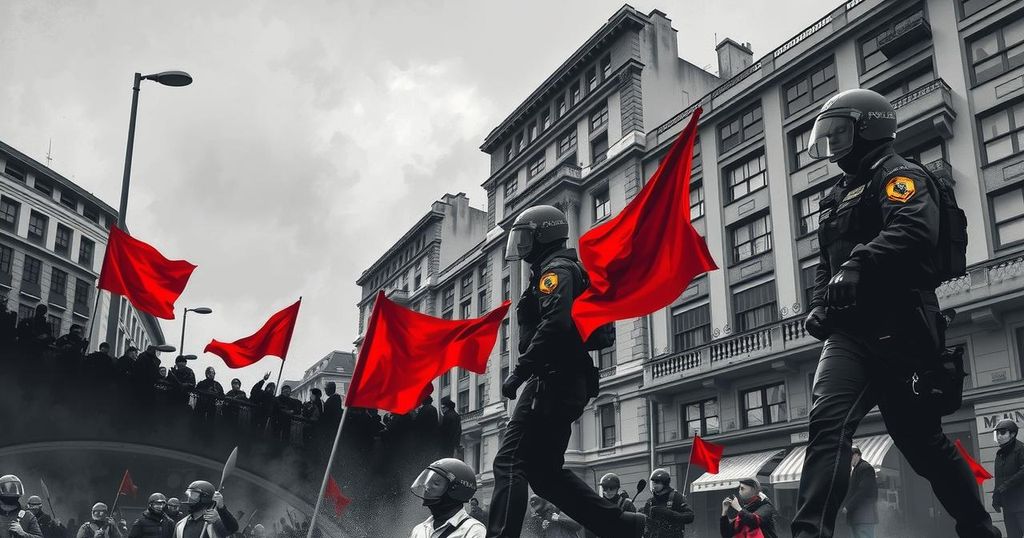Protests Against Trump’s Deportation Policy Shape Political Landscape
Nationwide protests against Trump’s mass deportations are spotlighting the precarious political landscape as Democratic leaders seek to rally amidst challenges. The White House’s aggressive rhetoric aims to galvanize support while risking public backlash. Democrats, lacking unified leadership, face a daunting challenge in responding effectively to the current crisis.
Protests against Donald Trump’s mass deportations are gaining momentum, raising questions about their potential to shape not just his presidency but also future elections. In an unexpected turn of events, the political landscape may be influenced by these demonstrations, especially as Democrats scramble to recover after their setbacks in 2024. The ongoing protests, unfolding particularly in Los Angeles, reveal much about the fierce political climate as leaders from both parties grapple with difficult choices and navigate their future strategies.
Trump’s aggressive tactics reflect his dual motivations: a show of strength and an eager grab for additional power. The increasing tension between protesters and federal forces could spiral out of control, and there’s a clear risk that things could turn tragic. With the president deploying National Guard troops and Marines in response to unrest, the stakes are becoming much higher. Democrats are understandably worried about appearing weak, but with figures like California Governor Gavin Newsom stepping up, they may have the champion they need.
Meanwhile, the White House’s communications are blunt and aggressive. Spokesperson Karoline Leavitt articulated a harsh stance, asserting the Democrats are siding with criminals against law enforcement. This narrative aims to paint those targeted by ICE as dangerous characters, manipulating public sentiments against them. It’s an effort to dehumanize individuals caught in the deportation efforts – many of whom are just seeking safety or opportunity.
Leavitt’s statements also serve to revive a previously effective narrative for Republicans, suggesting that Democrats oppose the police. In the heightened drama of current events, she has been keen to assert that the actions of violent protesters threaten the very fabric of American society. It’s a strategic move to generate fear and rally support for Trump’s strict immigration tactics, despite the underlying risks of inciting further unrest.
But is all this belligerence politically advantageous for Trump? Is there a chance that his tough stance might gain some support among the American public, perhaps legitimizing the controversial deployment of troops on US soil? His base has generally rallied around his brash rhetoric and hardline policies on immigration. That said, the danger lies in provoking a wider conflict that might unravel and cost lives.- Trump’s record indicates he has struggled when pushing crises to extremes, putting him in precarious territory as he runs again for the presidency.
And as deportations ramp up, polls suggest Americans support tougher immigration policies – but may balk at the idea of families being torn apart. History has shown us the kind of outrage that can stem from severe immigration tactics, recalling the backlash to the zero-tolerance policy from Trump’s first term. A symbolic image of cruelty could reignite public outcry and damage Trump’s standing.
At the same time, the Democrats are in a tough spot, lacking a unified message or leadership in this tumultuous moment. Governor Newsom is taking on the challenge, offering a much-needed voice for those who have watched Trump challenge democratic norms in recent months. His recent address was a calculated move to provide direction, as many within the party look for a rallying point.
Many Democrats eyeing potential presidential runs in 2028 would do well to tread carefully. They must balance supporting progressive issues while courting centrists disillusioned by recent actions. All of this politicians must navigate while avoiding alienating voters whom a hardline stance may push away.
The prior Black Lives Matter movements show that mixed responses to crises within the party can lead to disaster at the polls. As they consider their next steps, Democrats need to ensure that calls to action don’t steer the party into a no-win scenario. Trump’s maneuvers may challenge constitutional limits, but the ramifications of his actions could leave a lasting imprint on both parties’ futures, especially if the public perceives a constitutional crisis underfoot.
In summary, the rising tide of protests against Trump’s immigration policies and his aggressive responses could redefine the political landscape in the United States. Trump’s strategies, while aiming to present strength, risk exacerbating tensions, potentially leading to tragic outcomes. Democrats, lacking a clear message or leadership, find themselves in a difficult position as they grapple with the impact of these protests on their electoral prospects. The outcomes of this volatile situation could have lasting repercussions for both parties moving forward.
Original Source: www.cnn.com
